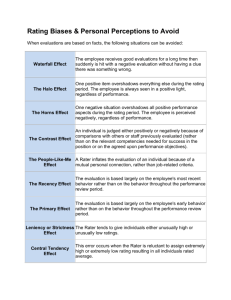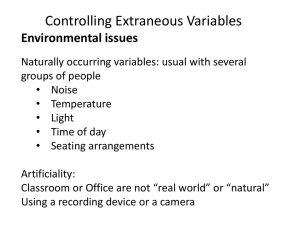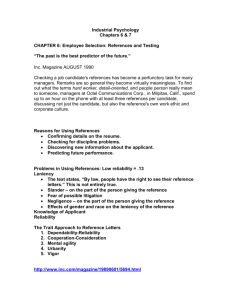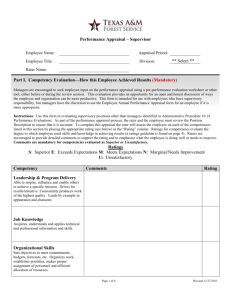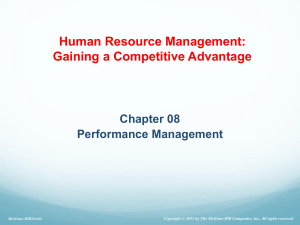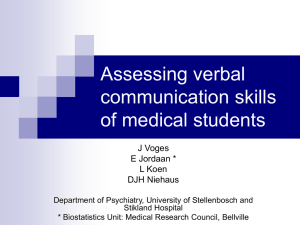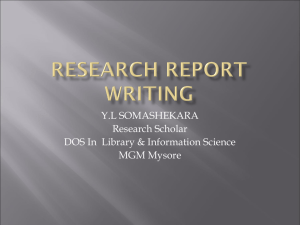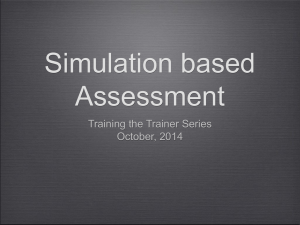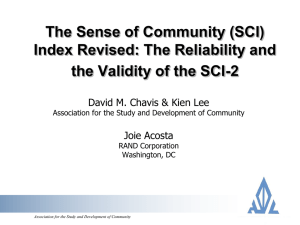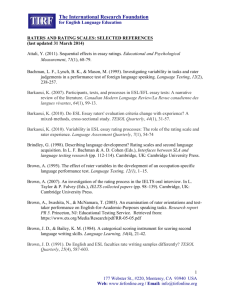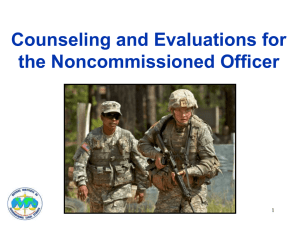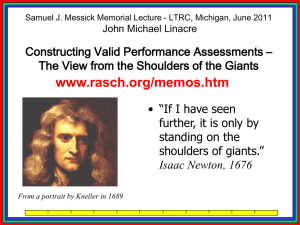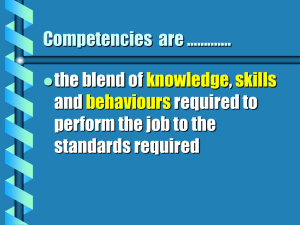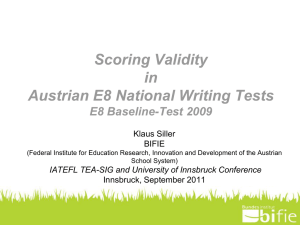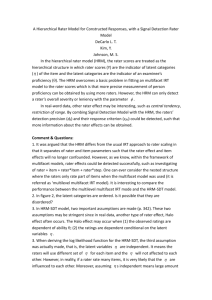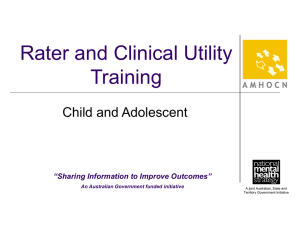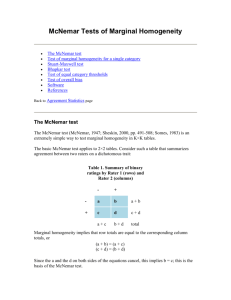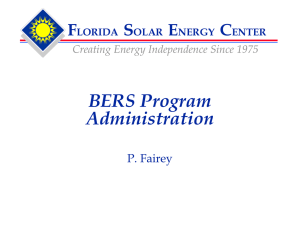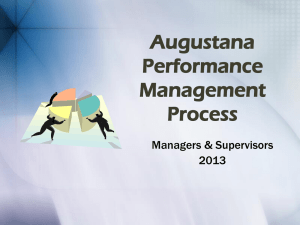Assessing Written English Skills for Business Communication
advertisement
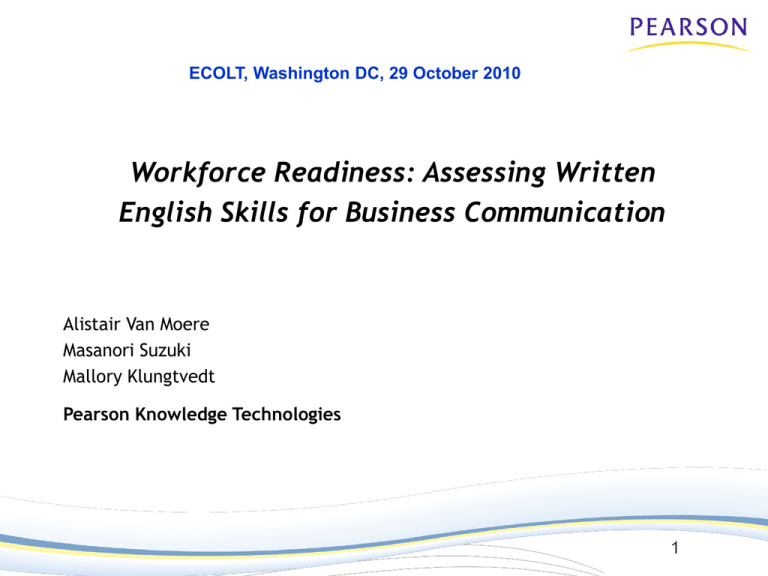
ECOLT, Washington DC, 29 October 2010 Workforce Readiness: Assessing Written English Skills for Business Communication Alistair Van Moere Masanori Suzuki Mallory Klungtvedt Pearson Knowledge Technologies 1 Development of a Workplace Writing Test 1. 2. 3. 4. 5. Background Test & task design Validity questions Results Conclusions 2 Widely-used Assessments of Written Skills 3 Widely-used Assessments of Written Skills Needs Gap Few authentic measures of writing efficiency Lack of task variety 2-3 weeks to receive scores Only an overall score reported Inflexible structure: only BULATS offers a writing only test 4 Needs Analysis • Interviewed 10 companies from 5 countries • Online questionnaire, 157 respondents Multi-national companies Business Process Outsourcing (BPOs) companies HR managers Recruitment managers Training managers 5 Needs Analysis Results 6 Needs Analysis Results SPOKEN MODULE WRITTEN MODULE 7 Testing goals • • • • • • Flexible testing: target desired skills Speed and convenience Quick score turnaround (5 mins) Computer delivered; Automatically scored Workplace-relevant tasks Efficiency and appropriateness of written skills 8 “Versant Pro” - Written Module Time/ Task mins Num of Items Description 1 Typing 1 Type as many words in the presented text as possible 8 Sentence Completion 18 Read a sentence enter a word Our return ( )and is detailed in thethat is missing attached document for future reference. 6 Dictation 14 Listen to a sentence and type it 8 Passage Reconstruction 4 Read a passage for 30 sec, then reproduce the passage in 90 sec 18 Email Writing 2 Compose an email to a client, colleague, supervisor in 9 min 45 mins, 5 tasks, 39 items 9 10 11 12 Overall Score (20-80) • • • • • Grammar Vocabulary Organization Voice & Tone Reading Comprehension Additional Information • Typing Speed • Typing Accuracy 13 Development of a Workplace Writing Test 1. Background 2. Test & Task Design a) b) c) d) Item specifications Item development Field testing Rating scale design 3. Validity Questions 4. Results 5. Discussion 14 Item Specifications Email Writing task with 3 themes: • Cognitively relevant • No specific business/domain knowledge required • Free of cultural/geographic bias • Elicits opportunities to demonstrate tone, voice, organization • Control for creativity • Constrain topic of responses for prompt-specific automated scoring models 15 Item Development Source material Word list Expert review • Texts modeled on actual workplace emails • Situations inspired from workplace communication • General English: Switchboard Corpus ~8,000 most frequent words • Business English: 4 corpus-based business word lists ~3,500 most frequent words • Internal reviews by test developers • External reviews by subject matter experts 16 Rating Scales Passage Reconstruction Trait (0-6) Narrative Clarity & Accuracy Description Ability to reproduce writing in clear, understandable, accurate English. Ability to convey fully the situation, characters, actions and ending of a text. Email Writing Trait (0-6) Description Organization Extent to which the content of the email is logically organized. Email Conventions Extent to which the text conforms to conventions of formal email writing. Grammatical Range & Accuracy Range and control of sentence structure, grammar, and accuracy of spelling, punctuation, and capitalization. Task Completion Extent to which the written performance fulfills the requirements of the task, and addresses and elaborates on the three themes. Voice/Style Extent to which the writing is appropriate for / demonstrates an awareness of the topic, purpose, and audience. Vocabulary/Word Choice Range of vocabulary and the accuracy and appropriacy of its use for the topic, purpose, and audience. 17 Field Testing Top 10 Countries Category Num Tests Mean Age India Non-Natives 1600+ 27.9 Korea Natives 700+ 35.6 Philippines China Other countries include: Japan France, Spain, Italy, Costa Rica, Russia, Iraq, Taiwan, Czech, Columbia, Yemen, Iran, Malaysia, Vietnam, Thailand, Venezuela, Nepal, etc….. Argentina Iran Armenia Mexico Germany 51 countries 58 L1s Period: August 2009 – November 2009 18 Validity Questions 1. Do the tasks elicit performances which can be scored reliably? a) Rater reliability b) Generalizability? 2. Does the rating scale operate effectively? a) Do the traits tap distinct abilities? b) Are the bands separable? 3. What is the performance of machine scoring? a) Reliability b) Correlation with human judgments 19 Validity Questions 1. Do the tasks elicit performances which can be scored reliably? a) Rater reliability b) Generalizability? 2. Does the rating scale operate effectively? a) Do the traits tap distinct abilities? b) Are the bands separable? 3. What is the performance of machine scoring? a) Reliability b) Correlation with human judgments 20 Rater Reliability Passage Reconstruction Trait Email Writing Average of rater pairings Trait Average of rater pairings Narrative Clarity & accuracy .94 Email Conventions .85 Task Comp .84 Exact Agreement 47 % Organization .85 Word Choice .88 Grammar .87 Voice/Style .81 Overall Score .94 Exact Agreement 47 % (21,200 ratings, 9 raters) 21 Generalizability Coefficients Number of Raters Number of items 1 2 3 4 1 0.71 0.75 0.77 0.77 2 0.83 0.86 0.87 0.87 3 0.88 0.90 0.91 0.91 4 0.90 0.92 0.93 0.93 Average of 2 ratings Number of items 1 0.76 2 0.86 3 0.90 4 0.93 (n=2,118 * 4 prompts * 2 ratings) 22 Validity Questions 1. Do the tasks elicit performances which can be scored reliably? a) Rater reliability b) Generalizability? 2. Does the rating scale operate effectively? a) Do the traits tap distinct abilities? b) Are the bands separable? 3. What is the performance of machine scoring? a) Reliability b) Correlation with human judgments 23 Email Writing ----------------------------------------------------------------------------------------------|Measr|+calls |+graders |+ trait | Gram |Voc |Conv |Style | Org |Task| ----------------------------------------------------------------------------------------------+ 5 + *. + + + (6) + (6) + (4) + (6) + (6) + (6) + | | . | | | | | | | | | | | *. | | | --- | --- | | | | | | | * | | | | | | | --- | | + 4 + + + + + + + --- + + + | | . | | | | | | | | --- | | | . | | | 5 | 5 | | | | | | | . | | | | | --- | | 5 | | + 3 + *. + + + + + + 5 + + + | | **. | | | --- | --- | | | | 5 | | | **. | | | | | | | --- | | | | *. | | | | | 3 | --- | | --- | + 2 + * + + + 4 + 4 + + + + + rater1 rater3 | | ***. | Andrea LaTesha | | | | | 4 | 4 | | rater4 | | ***. | Mallory | | | | | | | 4 | rater5 | | **** | Cole | | --- | | --- | | | | rater2 + 1 + ***. + John + + + --- + + --- + --- + + | | ***. | | | | | | | | --- | | | *****. | | conv | | | | | | | | | ***. | | task | 3 | | 2 | 3 | 3 | | * 0 * ******. * * vocab * * 3 * * * * 3 * | | ****** | | gram org style | | | | | | | | | *******. | | | | | | --- | --- | | | | ***** | | | --- | | | | | --- | + -1 + *****. + + + + --- + --- + + + + | | ***. | | | | | | | | | | | ***. | | | | | | 2 | | 2 | | | ***. | | | | | | | 2 | | + -2 + **. + + + 2 + 2 + + + + + | | *. | | | | | 1 | | | --- | | | ***. | | | | | | --- | | | | | *. | | | | --- | | | --- | 1 | + -3 + . + + + + + + + + + | | *. | | | --- | | | 1 | | | | | . | | | | 1 | --- | | | | | | . | | | | | | | 1 | --- | + -4 + . + + + 1 + + + + + + | | . | | | | | | --- | | | | | | | | | --- | | | | | | | | | | --- | | | | --- | | + -5 + + + + + + + + + + | | | | | | | | | | | | | | | | | | | | | | | | . | | | | | | | | | + -6 + *********. + + + (0) + (0) + (0) + (0) + (0) + (0) + ----------------------------------------------------------------------------------------------|Measr| * = 5 |+graders |+ | S.1 | S.2 | S.3 | S.4 | S.5 | S.6 | 24 Inter-correlation matrix Conven -tions Task Completion Organization Vocabu -lary Gram -mar Email Conventions Task Completion 0.79 Organization 0.83 0.90 Vocabulary 0.83 0.89 0.88 Grammar 0.82 0.85 0.87 0.92 Voice & Tone 0.82 0.87 0.89 0.91 0.88 25 Validity Questions 1. Do the tasks elicit performances which can be scored reliably? a) Rater reliability b) Generalizability? 2. Does the rating scale operate effectively? a) Do the traits tap distinct abilities? b) Are the bands separable? 3. What is the performance of machine scoring? a) Reliability b) Correlation with human judgments 26 Subscore reliability Split-half Reliability Machine-to-Human Correlation Grammar .98 .99 Vocabulary .91 .98 Organization .87 .90 Voice & Tone .90 .91 Comprehension .93 .96 Overall .98 .98 27 Email Human Rating Email items - Machine score vs Human Score Email Machine Score 28 Overall Human Score Versant Pro - Machine score vs Human Score Overall Machine Score 29 Human CEFR Estimate Machine score vs CEFR judgments 6 panelists IRR = 0.96 Versant Pro Machine Score 30 Limitations/Further work • • • • • • Predictive Validity Concurrent validity Score use in specific contexts Dimensionality (factor analysis, SEM) Constructs not assessed, under-represented Explanation/limitations of machine scoring 31 Conclusion • Automatically-scored test of workplace written skills: Modular, flexible Short (45-mins) 5-min score turnaround Job relevant Task variety • Common shortfall in task design – written & spoken – is planning time and execution time • Shorter, more numerous, real-time tasks are construct-relevant, efficient and reliable. 32 Thank you alistair.vanmoere@pearson.com 33
